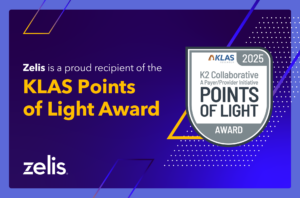
By Amanda Eisel
Amanda Eisel has focused the last 20 years of her career at the intersection of healthcare and technology. She has been deeply involved creating and scaling multiple growth technology companies including Waystar, Applied Systems and Viewpoint. Amanda has been a member of the Zelis team since 2019, playing a leadership role across Zelis’ growth, operational and talent strategies. Amanda started her career at McKinsey & Company, where she spent nearly a decade advising consumer companies. Prior to Zelis, Amanda was an Operating Partner at Bain Capital focused on technology and healthcare IT companies.
Hello — thank you for checking in and reading my blog. Whether it’s your first time here or you’ve been reading over the past few months, I’m glad you’re here. Because this month, I’m writing about a subject that I’m passionate about and that has been part of my working life for a very long time: technology.
I often say it’s a ton of fun to invest in technology. Not just because it’s ever-changing and always exciting, but because technology has the power to solve hard problems. I’ve always believed that within healthcare, most of the hard problems can only be solved through the right application of technology. Now – in this role and in this organization – I’m more confident than ever that many of our problems can be solved with smart technology. What’s more, solving these problems will improve the healthcare experience for all participants.
Digital transformation is not a new concept. As humans, we’ve evolved constantly and have leveraged technology to improve all kinds of processes and experiences in almost every aspect of modern life. It’s incredible to think about what we can do today on our smartphones and tablets alone.
However, the financial side of the healthcare industry has been slower to adopt emerging technology, due to the complexity of the industry, though the pandemic has accelerated adoption. Indeed, even after this event, only 78% of health systems and hospitals report using some form of automation in their revenue cycle operations. But today, we use technology for many (if not all) of our day-to-day transactions – with further acceleration due to the pandemic. So, stakeholders across the healthcare payments industry have realized that now is the time to embrace technology.
I see three main areas where smart technology solutions can make a big difference in healthcare:
Leveraging data to drive affordable and accessible care
Healthcare consumers often struggle to find covered providers where and when they need them, particularly in rural areas where access challenges primarily fall into two buckets: geographic distance from a healthcare provider and provider shortages. Given provider shortages, it is critical for insurers and third-party administrators to leverage big data to inform network access, including geographic coverage and specialty provider networks. Tools like web scraping, advanced data analytics, and provider registries are critical to evaluating if payers have appropriate network adequacy for their members.
Additionally, price transparency is critical for members. In the past two years, 1 in 5 insured adults had an unexpected medical bill from an out-of-network provider and more than two-thirds of adults worry about affording unexpected medical bills. Advanced analytics can help payers, providers, and members provide data on prices across providers to help all parties make more informed care choices.
Eliminating check and paper-based payments
Around 25% of payments between payers and providers go via paper check. And while we have worked together to remove a ton of paper from existing processes, about $450 billion in paper check payments remain across providers today, according to data from CAQH and despite the uptick in e-payment adoption during the pandemic. That’s a lot of checks in the mail, with costly and risky manual processes that follow. Therefore, I see an opportunity to close the last mile of paper payments transitioning to e-payments, to speed up reimbursements and to reduce the time and money spent cashing checks.
As an industry, we must move at pace to take advantage of the electronic payment systems that are at our fingertips and meet the demands of an increasingly digital population. If we can remove even more paper caught up in the healthcare payment experience by using smart technology and digital communication tools, it will benefit us all.
Applying advanced technologies for payment accuracy
It’s estimated that one-third of U.S. healthcare spending is spent on errors, abuse, and administrative waste, much of it claims management and billing. That amounts to roughly $1 trillion annually, or $2,500 per person in unnecessary spending every year. To improve accuracy and efficiency with our spending, we must combine investment in artificial intelligence such as machine learning, natural language processing, and robotic process automation, as well as integrating claims, provider, and payments data to harness intelligence from siloed data assets.
It is vital to the sustainability of our healthcare system that we ensure payment integrity. But it requires widespread adoption of data-driven payment accuracy processes to do at-scale.
The Wrap Up
If there’s only one lesson we come away with from the pandemic, it’s that the biggest risk to our healthcare system is maintaining the status quo. We must sustain the current pace of innovation that was accelerated over the past two years to overcome the challenges within America’s healthcare system.
During my career, I’ve seen many companies invest deeply and strategically in disruptive technology that transform entire industries. When we apply these same principles of investment to an industry that touches every American and dramatically needs improvement, the outcome can be truly transformative and create positive and meaningful outcomes for society.
I’m proud that Zelis is making such investments to improve and integrate our platforms, taking the lead step for our clients in making healthcare more affordable and transparent for all.
Until next time, stay well!



